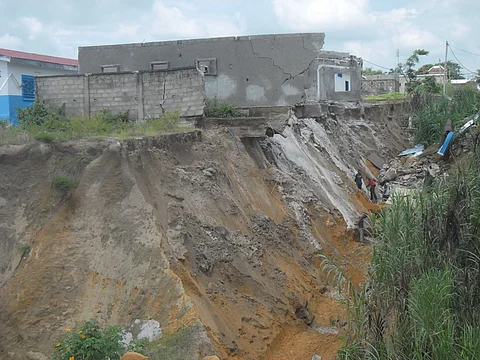

At the heart of the Congo Basin, the world’s second-largest rainforest, the Republic of Congo is grappling with the severe effects of climate change. Rising sea levels, floods, soil erosion, drought, and biodiversity loss are threatening ecosystems and the livelihoods of people who depend on forests, water and agriculture.
Urban areas are also suffering. Deteriorating infrastructure, poor sanitation and growing health risks mean every rainy season brings anxiety and fear of losing everything.
The country’s capital, Brazzaville, is located on the banks of the Congo River, opposite Kinshasa. The city is struggling with recurrent flooding, severe soil erosion and poor sanitation, all of which pose significant risks to its residents.
This year, unusually intense rains during the dry season in June surprised residents and led to seven deaths. For several years, erosion has intensified, particularly in outlying areas, leaving some families homeless.
Torrential rains made 2023 one of the most catastrophic years on record, affecting 1.79 million people and disrupting the education of tens of thousands of children. Between late 2019 and early 2020, severe floods submerged over 100 villages, affecting 170,000 people and destroying homes, crops and public services.
Among the tragedies that have marked the collective memory are the deaths of a mother and son in 2022, carried away by floodwaters. In 2019, two women, a teenager and a pregnant woman were all found dead after being buried under sand. Such scenes have become sadly common in several neighbourhoods.
As the rains fall, land in Brazzaville gives way, carrying away houses, roads and sometimes lives. The situation is worsened by a lack of sustainable urban planning, uncontrolled building, inadequate drainage and insufficient infrastructure maintenance.
Despite these challenges, the country is committed to an ecological transition. Through large-scale projects, new public policies and environmental diplomacy, the government is working to balance climate resilience with sustainable development.
In his 2024 State of the Nation speech, President Denis Sassou N’Guesso acknowledged that climate change is exacerbating natural risks. "Climate change exposes our urban areas to natural disasters. It is urgent to accelerate urban resilience projects in Brazzaville and Pointe-Noire," he told Parliament, highlighting the need for a new urban planning code to regulate development.
The government has launched several frameworks to address climate risks, including the National Climate-Biodiversity Policy, which is currently being finalised. The country has also been accredited with the Green Climate Fund, which will make it easier to access international funding.
On the ground, several projects are underway, focusing on climate-smart agriculture, agroforestry, community reforestation and green infrastructure. These include the Capacity Building Project for Climate Change Adaptation, which promotes resilient activities in vulnerable areas and an agroforestry programme to reduce deforestation.
In the energy sector, Congo is accelerating its transition to renewables. The Sounda hydroelectric dam project, scheduled to begin this year, aims to produce between 600 MW and 800 MW at an estimated cost of $9.4 billion (Rs 82.37 crore).
At the same time, projects such as Ignié 2021-2046, which combines solar and biomass energy, and initiatives led in partnership with the company Eni, are promoting rural electrification by bringing solar power to schools, health centres and water wells.
Congo’s vast tropical forest is at the heart of the Biodev 2030 programme, which integrates multi-stakeholder dialogue, biodiversity certificates and payments for ecosystem services.
The National Tree Day, celebrated annually since 1986, encourages civic engagement. In 2024, the theme was: “Let’s Mobilise: Two Million Trees for Green and Sustainable Cities.”
Among other projects are BaCaSi, a joint initiative with TotalEnergies that combines reforestation and agroforestry and a new project to protect and study the carbon-rich peatlands around Brazzaville. These ecosystems are vital in the fight against climate change.
At 29th Conference of Parties (COP29) to the United Nations Framework Convention on Climate Change, President Sassou-Nguesso presented the C-15 initiative for climate justice, calling for the value of natural capital to be included in GDP calculations.
Congo is a co-founder of the Congo Basin Blue Fund, a pan-African mechanism launched in 2018 that aims to finance resilience projects across 17 countries, including reforestation and sustainable agriculture. So far, 254 projects have been identified.
On June 7, 2025, Congo ratified the Biodiversity Beyond National Jurisdiction Agreement on marine biodiversity. The country has also proposed to the United Nations the establishment of a “Decade of Global Tree Planting and Reforestation.”
From October 26 to 28, 2023, Brazzaville hosted the Second Summit of the Three Basins — Amazon, Congo and Borneo-Mekong — which brought together over 3,000 participants. The event, led by Minister Arlette Soudan-Nonault, aimed to strengthen a global coalition for the protection of tropical forests and biodiversity.
A joint declaration was adopted, pledging stronger cooperation and the development of a shared roadmap, reaffirming the Congo Basin’s key role in global environmental governance.
Local NGOs are also playing a crucial role in the fight against the climate crisis. In Pointe-Noire, Renatura works to preserve marine turtles and coastal biodiversity, while AZUR Development trains communities on climate adaptation.
In Brazzaville, Alliance Climat runs environmental and civic education campaigns and ID Congo promotes the use of improved stoves to reduce pressure on forests. Other organisations, like PEA and Congo Conservation Society, focus on waste management, ecological agriculture and conservation.
Despite the promising momentum, obstacles remain, including limited access to funding and a lack of reliable climate data and local technical capacity. The private sector’s involvement in climate action also remains marginal.
The Republic of Congo is working to build a resilience model rooted in its local realities but open to new innovations and regional cooperation. Far from being confined to a position of vulnerability, Congo is now aiming to be a leader in Africa’s ecological transition.